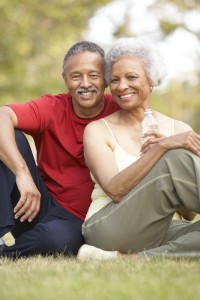
The information in this article is taken from “The Issue of Aging” a continuing education course authored by gerontology specialist Sandy Stoub, MS.
The aspect of “social”-ology of exercise is an important consideration for older adults. While the physiological aspects of exercise are important, the psychological and sociological aspects cannot be overlooked. Research supports the theory that compliance in programs seem to be better with older adults when there is accountability to someone else. Independent home exercise programs, while convenient, do not seem to result in long term participation and the resulting lifestyle and health changes desired.
By creating social interactions in class, your clients can build adherence and loyalty. Consider challenges, partner work, small group circuits, and greeters for newer participants. Socialization after class with luncheons, coffee, pot-lucks, and outings also increase social connections. Allowing some “mix and mingle” or “walk and talk” during class allows for social needs to be met. (Rule of thumb: the feet have to keep moving faster than the mouth.)
Perceptual Changes in Aging
Aging as a process seems to change the way people perceive themselves. For some, your greatest accomplishment and purpose “the career” has passed. Often the individual, while anticipating opportunity in a new life stage, is also searching for a new sense of value and self-worth. Many psychologists believe that adult development does not involve discrete stages, but instead is the result of continuous processes which are impacted by situations and society. The finding of an activity and purpose assists in successful migration along the development process.
Sometimes the motivation of purposeful living can be a greater motivator for change than the recommendation by a physician to make changes purely for health. The will to continue quality living for function and independence or to continue a favorite activity (travel, hiking, hobbies, sports) is a strong motivator for positive change.
Class Support
The class exercise environment can provide a place for a person to grow in a variety of aspects. While seniors want to remain independent and maintain their place in the community, the community can become an isolated place to be. A class situation can provide the social contact so badly needed by individuals who live alone. When a class becomes a cohort of persons in a similar life stage, the group can provide support, comfort, and a new sense of identity. The class also provides a destination and a purpose to be accountable at a time, place, and to other people. This helps to maintain order in daily life which can easily become lost when there are no reasons to separate one day from the next.
Create Fun!
While there is no question that a well designed program should contain proper physiological elements, adding some time for fun can make a difference between a good class and a great class. My philosophy is to “hook people socially to help them physically.” Make the class “THE” place to be. While too much socialization can be distracting to a program, create limits by having a mix and mingle time and then call the meeting back to order.
Giving students jobs to do can also increase adherence. Include jobs such as…
- some students may serve as greeters to new students
- some can serve as partners to new students to guide them through the workout process
- some may move the lane lines in the pool
- some may want to organize after workout lunches or social events
- some students can put out or pick up equipment, or make sure everyone has the right equipment for the day’s workout
- some can be “line leaders” or help with guiding students to lines or circles
- someone can be in charge of clapping to signal the class has ended
Whatever the task, there is increased accountability to the program which in turn can increase benefit over time.
Reference: Stoub S. (2018) The Issue of Aging. www.FitnessLearningSystems.com.


